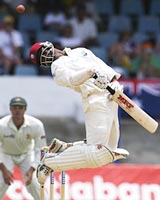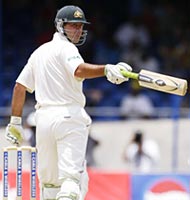Home > Cricket > Columns > Daniel Laidlaw
Positive Aussies have happier time
April 24, 2003
Australia-West Indies in the Caribbean is usually one of the better Test series to be sampled, and 2003 has proved no exception.
In 1999, Steve Waugh's first series as captain, the same combatants provided a memorable 2-2 draw, Brian Lara's three centuries the highlight after West Indies had been rolled for an abject 51 in the first Test. Intriguingly, the Australians now seem to regard their approach to that series as an example of what not to do.
Justin Langer wrote recently in his BBC column that Waugh told the team their fate this time would rest on attitude, describing the attitude of '99 as "lacklustre, lazy and complacent". Waugh himself told the Sydney Morning Herald of that series: "We were ill-disciplined in some ways and paid the price."
 All the signs this time around are that the attitude has indeed been positive. In a batsman-dominated series, the Sir Frank Worrell trophy has been retained in two Tests. West Indies may not be strong enough to inflict defeat, but they have carried the fight to Australia, reaching lunch on the last day of the second Test with a chance of victory. One of the main differences between the two teams has been selection.
All the signs this time around are that the attitude has indeed been positive. In a batsman-dominated series, the Sir Frank Worrell trophy has been retained in two Tests. West Indies may not be strong enough to inflict defeat, but they have carried the fight to Australia, reaching lunch on the last day of the second Test with a chance of victory. One of the main differences between the two teams has been selection.
In the past, this Australian team has dismissed traditional cricket concepts like nightwatchmen, batting first and using the fifth day of a match. In the first two Tests, they have departed from one of their own, selecting five specialist bowlers for the first time in recent memory.
As with most things they do, the move has been a success. Gillespie, Lee, Bichel, MacGill and Hogg have all been required, as the scores against them indicate. January's fifth Ashes Test provided the first strong indication there would be a time without Warne and McGrath when less potent bowling resources would mean Australia should consider five bowlers, and that time is now.
Given Australia felt it necessary to include an extra bowler, one wonders how the West Indian selectors justified their contentious team for the second Test. After West Indies conceded 489 and 147/1 in Guyana, where the problem was clearly taking wickets and not scoring runs, the selectors responded to paceman Jermaine Lawson's forced exclusion by picking all-rounder Dave Bernard Jnr -- at best, half a bowler.
Brian Lara had pointedly noted before the series that Carl Hooper would be missed for his bowling, not his batting. The lack of a spinner was West Indies' obvious weakness in the first Test loss, leading to the inclusion of off-spinner Omari Banks in the second Test squad. His surprising omission in favour of Bernard effectively left West Indies with just three specialist bowlers, and Australia duly amassed 576/4 and 238/3. The folly was only underlined by part-timer tweaker Marlon Samuels delivering 45 overs to Bernard's 11 for the match.
The tourists' winning approach to the series was shown not only in selection but also by Waugh's generous declarations. In both innings at Trinidad, Australia appeared to close prematurely, as Waugh left himself open to criticism and a Lara-inspired West Indies victory.
Gillespie aside, the Australian attack had been no better than ordinary in Guyana, the margin of victory flattering them. Without Warne and McGrath, they had conceded 362 and 462/9 (fifth Test v England), 132 and 402/6 (tour match), 489 and 147/1 (T1) and 408 (T2). Leaving the opposition to score 407 from 137 overs was thus something of a gamble. Waugh had laid down the challenge to his bowlers.
The first session of day five belonged in the Test cricket stratosphere, an exceptional exhibition of high quality bowling to high class batsmen. First Gillespie and Hogg, then Lee and MacGill, thoroughly examined the skill and nerve of Lara and Sarwan, but the pair were equal to it. Lee's spell to Lara in the nineties must have been one of the great wicketless spells of pace bowling, generating tremendous hostility on a flat track against a champion in peak form.
Australia has had no enduring answers to Lara. At his best, Lara appears capable of more than any other batsman in contemporary cricket. In the headlines he may be an Australian "target", and they must have plans for him, but on the field it makes no difference when Lara is at ease with his game. His dismissals so far have owed to either his or the umpires' mistakes, not the bowling.
Always the stylish dramatist, Lara's first hundred on his home ground was a special moment. His applause of his home supporters seemed to say "we finally did it – thank you". Despite losing only 7 wickets for 814, if Australia did not take wickets on the final day they would surely have lost. Despite West Indies chasing a world record, such comebacks have been characteristic of Australia's rare defeats.
 As it was, Bichel struck three times, Lara finally succumbed, and West Indies subsided. While each member of the bowling quintet contributed, Australia's two wins so far have been established to a rare degree by their batting dominance. Mostly, this is testimony to the conditions, the flat pitches and lightning outfields putting paid to West Indies' past reputation as a fast bowling paradise.
As it was, Bichel struck three times, Lara finally succumbed, and West Indies subsided. While each member of the bowling quintet contributed, Australia's two wins so far have been established to a rare degree by their batting dominance. Mostly, this is testimony to the conditions, the flat pitches and lightning outfields putting paid to West Indies' past reputation as a fast bowling paradise.
Every member of the top six bar Waugh has made hundreds, and that only due to lack of opportunity, with Waugh not required to bat in the second Test for just the second time in his career. With no excuses for not compiling massive scores, the Australian batsmen have switched their focus to batting for time, not runs, a different approach to the get-the-bowler-before-he-gets me attitude so frequently seen in recent years. The results, however, have been exactly the same, with 391/3 on the board by the end of day one effectively deciding who would control the game.
Ponting and Langer have never looked better. At 28, Ponting appears at the top of his game, the World Cup-winning captain having scored seven hundreds in his previous 12 Tests and having finally become the batsman his backers thought he would be. Darren Lehmann has at last established himself and Hayden, fighting for runs like a mortal again, is still making hundreds.
The Caribbeans is a much happier place for Australian batsmen than it once was.
More Columns